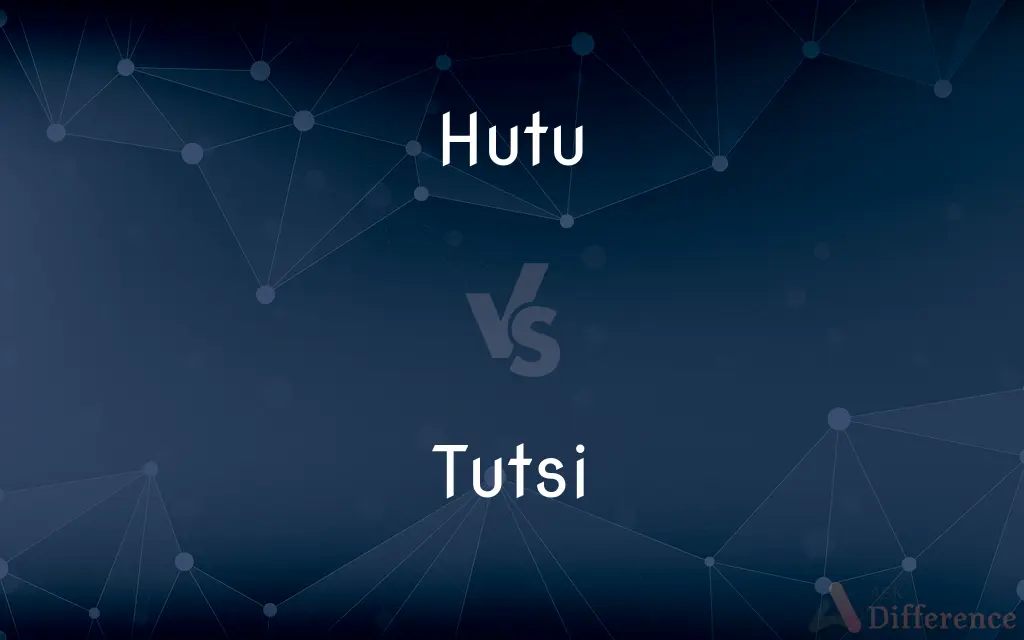Hutu vs. Tutsi — What's the Difference?
Edited by Tayyaba Rehman — By Urooj Arif — Updated on April 4, 2024
The Hutu are the largest ethnic group in Rwanda and Burundi, traditionally farmers, while the Tutsi, historically cattle herders, are a minority in the same regions.

Difference Between Hutu and Tutsi
Table of Contents
ADVERTISEMENT
Key Differences
The Hutu and Tutsi are ethnic groups primarily found in Rwanda and Burundi, with the Hutu being the majority. Traditionally, the Hutu have been associated with agriculture, cultivating the land for centuries. On the other hand, the Tutsi, despite being fewer in number, have historically been cattle herders, which granted them a higher socio-economic status in the pre-colonial period.
The socio-political landscape of Rwanda and Burundi has been significantly shaped by the historical distinctions between the Hutu and Tutsi. While the Hutu have historically been the majority population, they were often placed in subordinate positions under Tutsi rule during certain historical periods. Conversely, the Tutsi's minority status did not prevent them from occupying significant positions of power and influence, particularly in pre-colonial and colonial times.
Colonial rule intensified the distinctions between Hutu and Tutsi, as colonial powers, particularly the Belgians, implemented systems that favored the Tutsi over the Hutu based on racial theories and physical characteristics. This favoritism towards the Tutsi during the colonial era exacerbated tensions between the two groups, leading to significant socio-political ramifications. In contrast, the Hutu experienced marginalization, which has fueled conflict and resentment over the years.
In the post-colonial era, the dynamic between Hutu and Tutsi has been characterized by periods of intense conflict and efforts towards reconciliation. The genocide against the Tutsi in Rwanda in 1994 is a tragic example of how these tensions can erupt into violence. Conversely, there have been efforts in both Rwanda and Burundi to bridge the ethnic divide and foster national unity, reflecting a complex interplay of reconciliation and memory.
The cultural distinctions between Hutu and Tutsi have also been notable, with each group having its own languages, customs, and traditions that reflect their historical livelihoods. However, over time, these distinctions have become less pronounced, with intermarriage and urbanization contributing to a more integrated national identity. Despite this, the historical and cultural legacies of the Hutu and Tutsi continue to influence the social fabric of Rwanda and Burundi.
ADVERTISEMENT
Comparison Chart
Population Percentage
Majority in Rwanda and Burundi
Minority in Rwanda and Burundi
Traditional Livelihood
Agriculture (Farming)
Animal Husbandry (Cattle Herding)
Socio-economic Status Pre-colonial
Generally lower
Higher, due to cattle ownership
Colonial Period Role
Often marginalized
Favored by colonial powers
Post-colonial Dynamics
Various times in power; victims and perpetrators in conflicts
Significant political influence; targeted during genocide
Compare with Definitions
Hutu
A major ethnic group in Rwanda and Burundi, primarily engaged in agriculture.
The Hutu farmers are preparing for the planting season.
Tutsi
A minority ethnic group in Rwanda and Burundi, known for cattle herding.
The Tutsi herders are moving their cattle to new grazing lands.
Hutu
Traditionally had a lower socio-economic status compared to the Tutsi.
Historically, Hutu were often governed by Tutsi chiefs.
Tutsi
Historically held a higher socio-economic status due to cattle ownership.
Tutsi families often wielded significant influence in their communities.
Hutu
Marginalized by colonial policies favoring the Tutsi.
Under Belgian rule, the Hutu's grievances intensified.
Tutsi
Known for pastoral traditions and rituals.
Tutsi ceremonies often include songs praising cattle.
Hutu
Rich traditions in farming and community life.
The Hutu celebrate harvest festivals with dance and music.
Tutsi
Favored by colonial authorities, leading to tensions.
Colonial favoritism towards the Tutsi sowed seeds of discord.
Hutu
Both victims and perpetrators in the Rwandan genocide.
The Hutu majority was involved in the 1994 genocide.
Tutsi
Targeted in the Rwandan genocide.
In 1994, over 800,000 Tutsi were killed in a mass genocide.
Hutu
The Hutu (), also known as the Abahutu, are a Bantu ethnic or social group native to the African Great Lakes region of Africa. They live mainly in Rwanda, Burundi and the eastern Democratic Republic of the Congo, where they form one of the principal ethnic groups alongside the Tutsi and the Great Lakes Twa.
Tutsi
The Tutsi (; Kinyarwanda pronunciation: [ɑ.βɑ.tuː.t͡si]), or Abatutsi, are an ethnic group of the African Great Lakes region. Tutsi are a Bantu-speaking ethnic group of probable Nilotic origin, and the second largest of three main ethnic groups in Rwanda and Burundi (the other two being the largest Bantu ethnic group Hutu and the Pygmy group of the Twa.Historically, the Tutsi were pastoralists and filled the ranks of the warriors caste.
Hutu
A member of a Bantu people inhabiting Rwanda and Burundi.
Tutsi
A member of a Bantu-speaking people inhabiting Rwanda and Burundi.
Hutu
A member of a Bantu people living in Rwanda and Burundi
Tutsi
A member of a Bantu speaking people living in Rwanda and Burundi
Common Curiosities
What are the main differences between Hutu and Tutsi?
The Hutu are primarily agriculturists and form the majority in Rwanda and Burundi, whereas the Tutsi, who are fewer, have traditionally been cattle herders with a higher socio-economic status.
What languages do Hutu and Tutsi speak?
Both groups primarily speak Kinyarwanda in Rwanda and Kirundi in Burundi, though distinctions in dialects have decreased over time.
Can Hutu and Tutsi be distinguished by physical features?
Colonial powers emphasized physical differences, but such distinctions are not reliable indicators of ethnicity.
Are there still tensions between Hutu and Tutsi today?
While there have been significant efforts towards reconciliation, historical grievances and memories of past conflicts continue to influence Hutu-Tutsi relations.
How do Hutu and Tutsi cultures differ?
Their cultures reflect their historical livelihoods, with the Hutu having rich farming traditions and the Tutsi known for their pastoral customs.
How did the colonial powers differentiate between Hutu and Tutsi?
Colonial authorities used arbitrary racial theories and physical characteristics, which intensified ethnic divisions.
What role do Hutu and Tutsi play in the politics of Rwanda and Burundi?
Both groups participate in the political process, with efforts to ensure representation and prevent ethnic dominance.
How is the genocide remembered in Rwanda?
The genocide is commemorated annually to honor the victims and promote unity and peace.
How has urbanization affected Hutu and Tutsi identities?
Urbanization has contributed to a more integrated national identity, reducing the prominence of ethnic distinctions.
How did colonialism affect the Hutu and Tutsi?
Colonialism exacerbated the differences between them, with policies that often favored the Tutsi and marginalized the Hutu.
What led to the Rwandan Genocide?
Long-standing ethnic tensions, exacerbated by colonial legacies and political power struggles, culminated in the genocide against the Tutsi in 1994.
What are the socio-economic statuses of Hutu and Tutsi today?
Socio-economic differences have blurred due to national development efforts, although historical perceptions persist.
Are Hutu and Tutsi the only ethnic groups in Rwanda and Burundi?
While they are the major groups, there are other ethnic minorities, such as the Twa, who are indigenous to the region.
How have Hutu and Tutsi relationships changed over time?
Relationships have evolved from periods of conflict to efforts at national reconciliation and unity, though challenges remain.
What efforts have been made towards reconciliation between Hutu and Tutsi?
Efforts include national dialogues, justice initiatives like the Gacaca courts, and education programs promoting unity.
Share Your Discovery

Previous Comparison
Clay vs. Ceramic
Next Comparison
Scrapple vs. GoettaAuthor Spotlight
Written by
Urooj ArifUrooj is a skilled content writer at Ask Difference, known for her exceptional ability to simplify complex topics into engaging and informative content. With a passion for research and a flair for clear, concise writing, she consistently delivers articles that resonate with our diverse audience.
Edited by
Tayyaba RehmanTayyaba Rehman is a distinguished writer, currently serving as a primary contributor to askdifference.com. As a researcher in semantics and etymology, Tayyaba's passion for the complexity of languages and their distinctions has found a perfect home on the platform. Tayyaba delves into the intricacies of language, distinguishing between commonly confused words and phrases, thereby providing clarity for readers worldwide.














































